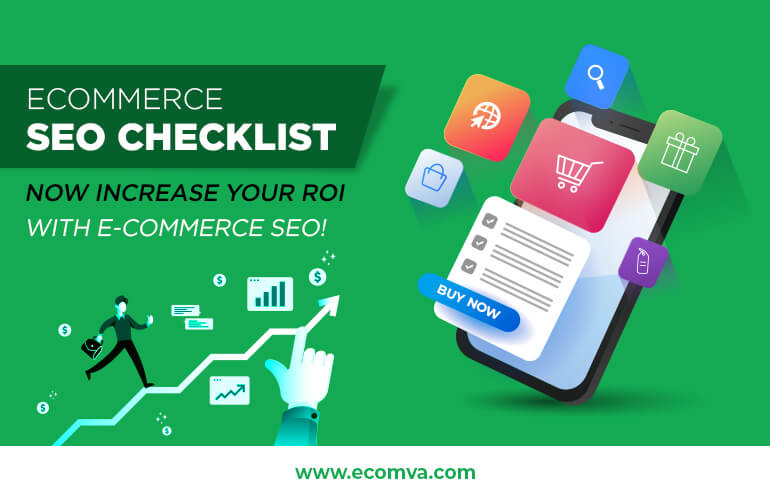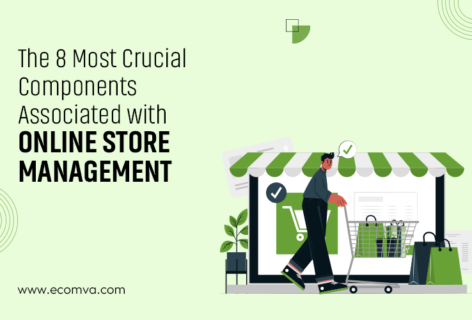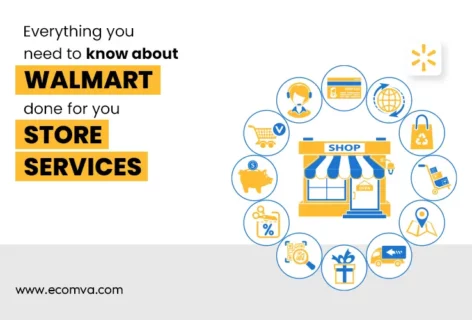E-Commerce SEO Checklist: Now Increase Your ROI with E-commerce SEO!

We know you might be stressed about getting the best resource for your e-commerce platform with so many digital marketing channels. Before you enter the online world, it is vital to have an e-commerce SEO checklist to ensure you have everything covered. You know,
Life is trying things to see if they work.
-Ray Bradbury
Why is an e-commerce SEO Checklist Vital for Websites?
When it comes to SEO for e-commerce, people are trying to invest the most but are still unable to meet the basic goals. The reason is that many simple things must be handled rather than focusing directly on paid marketing.
The frontlines where the e-commerce SEO checklist works are:
- Organic Visibility: This is a straightforward method. The first page of the search engine captures around 71% of the online traffic. So achieving top spots on the search engines will help you gain potential customers.
- Higher Sales: It is an undeniable fact that top websites have better chances to attract visitors. SEO contributes to increasing your digital presence and improving sales.
- Cost-Effective: Unlike paid campaigns, you should first try to maintain your website in terms of SEO. This will improve your organic traffic and save you money.
- Target Audience: If you follow the right SEO trends in the market, you will never miss a chance to appear in front of potential customers.
- Lasts Longer: Having an SEO-friendly website has benefits for an extended period. You just have to stay updated with the latest algorithms for better positioning.
We have curated the best e-commerce SEO checklist, which will help experts and beginners.
The E-commerce SEO Checklist for websites:
1. Work on SEO title
Try to create an interesting and unique title for users and search engines. Every product and service on your platform should have an SEO-friendly title. Some of the best tips to handle this are:
- Add your brand name in the titles
- Make them less than 60 characters
- Add more action words to promote CTA
- Add the important terms at the beginning
2. Optimize the Categories page
Never ignore your category pages in the store. They will increase your chances of appearing on the SERPs. It is critical to optimize them in the proper format:
- Add alt text in the image
- Insert keywords in the file name
- Use keywords in headings
- Add keywords in the page description
- Use keywords in the page title
3. Provide Structured Data
Many e-commerce SEO services are focusing on adding structured data to gain success. This will increase conversion rate, and click-through rates, and bounce rate, increase user engagement, and directly strengthen your online presence. Some of the features that you must have in your e-commerce store are:
- Name
- Ratings
- Shipping
- Price
- Color
- Currency
- Availability
- Features
- Functionality
These will help you to reach the rich snippets on the search engines.
4. Faster Page Loads
A wide range of websites take an average of 6 seconds to load their content. The best time to engage your audience is in 3 seconds or less. A few strategies you can use to handle this are:
- Add minimal redirects
- Optimize the image and video size
- Decrease the number of HTTP request
- Remove unused plugins or other extensions
- Support browser caching
5. Have a Social Media Presence
Many platforms bring traffic to your website and generate higher revenue. Ideally, it would help to have a presence on multiple social media platforms, depending on your target audience. Some famous social media platforms are:
- YouTube
- Medium
Choose the one that will help you engage a larger audience and gain potential customers for your e-commerce services.
6. Build an internal linking strategy
Every best e-commerce SEO service focuses on this SEO marketing strategy. The main idea is to link web pages of certain topics with other relevant content on the website. This helps to keep users on your platform for a longer period of time. The correct internal linking will build authority, categorize the content, and rank them on search engines. Certain methods you might want to implement to build internal links are:
- When the visitor comes to your platform, always suggest relevant products. This will make their search effortless and increase your user engagement.
- Display featured items on your website and include the popular products. Insert anchor text in your products and keywords
- Create content pieces about your products and services. This will help to provide more information to your audience and gain better rankings on search engines.
7. Build detailed keyword research
With over 1.9 billion websites online, it is a big challenge to target top rankings in the search engines. If you do not target the right keywords, it will hurt your business. Search engine pages look for content pieces that meet the user’s intent and provide the best solutions for the searched query. The broad categories of keywords in SEO are:
- Commercial Keywords: These are words that indicate the desire to buy products or services.
- Informational Keywords: These keywords will be a guide or tutorial related to your brand and services.
- Navigational Keywords: They are related to your products, location, or brand.
Target mostly on informational keywords, as users are specifically looking for them on the search engines. Categorize your keywords and organize them by volume. You must add keywords that have higher traffic and help you increase revenue for your business.
8. Add content that answers your user’s questions
When you begin to brainstorm content ideas, keep in mind your target audience, their search intent, specific requirements, and interests. The three main ideas that should be followed in a content marketing strategy are:
- Your content must have clear conclusions. You must provide solutions to the readers, whether you are writing about products or services.
- Focus on the quality of content over quantity. Include target keywords, analyze competition, and provide unique content to improve your rankings on search engines.
- Write for people first and then optimize for the search engines.
9. Build a brand link strategy
Link building helps search engines to understand the authority and value of the domains. The better authority, the better ranks on SERPs. In contrast, you need to focus on the links and build strong brand awareness in building marketing strategies. The best ways to implement this technique are to ensure the below targets:
- Brand Name: Create opportunities where you can mention your brands without directly linking to your store. Check the competitors and reach out to more websites to get backlinks to your store.
- Resource Pages: Look for web pages that work on similar products and services and reach out to them for a link.
Directory Websites: These should revolve around your industry or location. Ask them to mention your brands or add links to your store.
10. Image Optimization
Once you have worked on every small element, it is time to shift your focus to images. Ensure to add SEO-friendly images, which will help in achieving better ranks on your search engines. Some tips that you might consider are:
- Use SEO-friendly names for the images
- Add an alt-tag for every image on your platform
- Insert target keywords in the alt-tags
- Keep your file size below 70 KB to ensure faster page loads
- Prefer only PNG and JPEG formats for images
- If an image is from another source, add a link to it.
11. Handle technical SEO issues
You might need help from SEO services for e-commerce websites to manage this task as these might affect your online presence. There might not be a potential list, but here are some sectors you can focus on:
- Duplicate content, you should visit your web pages and remove them instantly
- No usage of HTTPS. To handle this, get an SSL certificate
- The difficulty for search engines to crawl your website, so remove the ‘noindex‘ meta tags
- Build an XML sitemap
- Images do not have the right sizes, which will affect your page loads
If you get stuck somewhere, there is always an option to get help from an e-commerce SEO company with experience and knowledge of your niche.
Final Takeaways!
We have tried to handle the vital segments in this e-commerce SEO checklist. We hope it will help you to improve your website performance and generate better leads. If you of any issues, feel free to get in touch with us! We have the best industry experts to handle everything related to e-commerce SEO.











